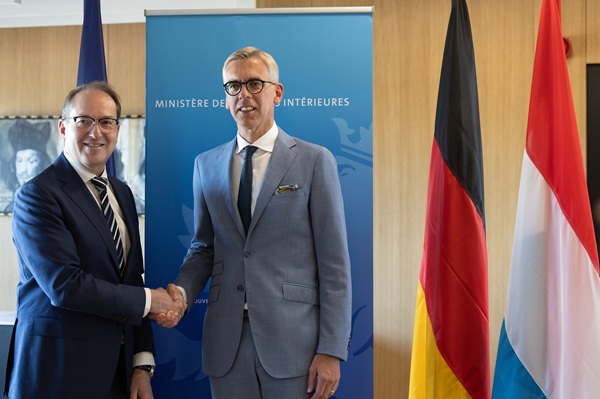 (L-R): German Minister Alexander Dobrindt; Minister Léon Gloden;
Credit: © SIP / Claude Piscitelli
(L-R): German Minister Alexander Dobrindt; Minister Léon Gloden;
Credit: © SIP / Claude Piscitelli
On Friday 30 May 2025, Germany's Federal Minister of the Interior, Alexander Dobrindt, was in Luxembourg for a working visit with Luxembourg's Minister of the Interior, Léon Gloden.
According to the Ministry of the Interior, the two ministers held a constructive exchange on border controls and migration policy at the European level, as well as on cross-border police cooperation. They welcomed the significant decline in irregular migration at Europe's external borders.
Minister Gloden was pleased that, during this meeting, Minister Dobrindt assured them that the border controls introduced on 16 September 2024, and recently intensified, would have as little impact as possible on the quality of life of the people in the Greater Region. "We must avoid creating borders in people's minds again. Schengen must live!" emphasised Minister Gloden. "Unnecessary disruptions to cross-border traffic must be prevented, in the interest of the daily lives of people in the Greater Region." Minister Dobrindt emphasised: "The Federal Police will ensure the smooth flow of cross-border travel and goods to the greatest extent possible. Smart border controls, which are carried out flexibly in terms of location and time, will keep the burden on commuters as low as possible."
On 14 February of this year, Luxembourg submitted a written objection to the extension of German border controls to the EU Commission.
The two ministers agreed to discuss the optimisation of the checkpoint on the Schengen Bridge, including a possible relocation. The ministers agree that solutions should be developed jointly and that open dialogue should be continued.
They also agreed on the importance of a modern and practical legal framework, such as a new police agreement and agreements based on the Schengen Border Code, which should allow for the further deepening and expansion of the existing good operational cooperation.
The two ministers addressed European migration policy and emphasised that common European solutions must be found and implemented by all Member States to ensure a responsible migration policy. An essential component of this is the EU Migration and Asylum Pact and the reform of return policy. Minister Gloden was also able to present Luxembourg's concept of voluntary return in this context.
Federal Interior Minister Dobrindt: "Germany and Luxembourg are neighbours, partners and friends. I would like to thank Minister Gloden for the trusting cooperation our authorities have built up over decades. We agree that we need a decisive course of action on migration policy in Europe. We must work together to further curb irregular migration to Europe. We have taken initial measures to this end in Germany. We will continue to engage in close dialogue on this issue with our neighbours, the EU Member States, and the European Commission."
Following the meeting, there was a short walk along the Corniche, and the working visit concluded with a dinner hosted by Minister Léon Gloden in honour of his German counterpart.








